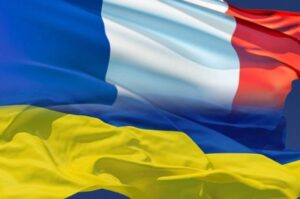
Experts Club analyzed the main macroeconomic indicators of Ukraine. In connection with the entry into force of the Law of Ukraine “On Protection of the Interests of Business Entities during Martial Law or a State of War”, the State Statistics Service of Ukraine suspends the publication of statistical information for the period of martial law, as well as for three months after its termination. The exception is the publication of information on the consumer price index, separate information on statistical indicators for 2021 and for the period January-February 2022. The article analyzes open data from the State Statistics Service, the National Bank, and think tanks.
Maksim Urakin, PhD in Economics, founder of the Experts Club think tank, presented an analysis of macroeconomic trends in Ukraine and the world based on official data from the State Statistics Service of Ukraine, the NBU, the UN, the IMF, and the World Bank.
Macroeconomic indicators of Ukraine
According to the Center’s founder, Maksym Urakin, in the first quarter of 2024, Ukraine’s GDP grew by 4.1% to 5.3% compared to the same period last year.
“The main growth factors were an increase in agricultural exports and production activity in certain industries. However, the negative balance of foreign trade in goods in the first quarter amounted to almost $6 billion, which is 10% more than last year. This is due to an increase in energy imports after the strikes on the Ukrainian energy sector in March,” Urakin said.
According to the founder of Experts Club, Ukraine’s national debt has reached a new historical high of $151 billion, which is almost 6 trillion hryvnia in hryvnia equivalent. Inflation in Ukraine in the first quarter was 1% year-on-year, which is in line with the NBU’s target range.
Global economy
Maksim Urakin noted that analysts forecast that the global economy will grow by 2% in 2024, which is lower than expected at the end of last year. The main reasons for the slowdown are high interest rates in developed countries and global geopolitical uncertainty.
“The US economy grew by 1.6% in the first quarter of 2024, which is lower than the growth rates observed in previous quarters, but still at an acceptable level for the development of the country’s economy. China’s economy grew by 5% due to a partial recovery from the crisis and government injections into the technology cluster,” the expert summarized.
He also reminded that the European Commission expects the eurozone economy to grow modestly in 2024 by only 0.8%, i.e. even less than 1%.
“High inflation and weak domestic demand remain the main problems of the EU countries. However, the British economy showed a modest growth of 0.6%, which indicates a weak recovery from the pandemic and Brexit,” Urakin said.
The economic situation in the world remains tense and depends on many factors, including geopolitical risks and changes in the global economic and political landscape. The Experts Club will continue to monitor the situation and provide up-to-date and balanced news.
Head of the Economic Monitoring project, PhD in Economics Maksim Urakin

UN economists have improved their forecast for global economic growth in 2024 to 2.7% from 2.4% expected in January.
In 2025, it will increase by 2.8%, while previously it was expected to be 2.7%.
The average growth rate of the global economy in the coming years is expected to remain below the 3.2% recorded on average in 2010-2019.
The revision of the estimate for the current year is mainly due to more positive changes in the economies of a number of large developed and developing countries, in particular Brazil, India, Russia and the United States, the organization’s report says.
According to UN estimates, the US economy will grow by 2.3% this year (1.4% was expected in January), the UK – by 0.8% (0.4%), China – by 4.8% (4.7%), Brazil – by 2.1% (1.6%), India – by 6.9% (6.2%), and Japan – by 1.2% (unchanged).
At the same time, the forecasts for the European Union and the euro area were revised downward – to 1% from 1.2% and to 0.8% from 1.1%, respectively.
“For both the European Union as a whole and the euro area, we expect a gradual recovery in economic activity in 2024-2025, after a noticeable stagnation in many European countries over the past year,” said Grigoriy Agabekyan of the UN Department of Economic and Social Affairs.
This should be facilitated by a slowdown in inflation (it is falling faster than expected in Europe due to a sharp decline in energy costs), income growth in real terms, and the expected easing of monetary policy.
“In fact, a number of central banks in Eastern Europe and the Swiss central bank have already cut their key interest rates, and as inflation returns to its target level, the European Central Bank and the Bank of England are also expected to begin their easing cycles this year. It is also expected that as global trade recovers, exports from European countries will increase,” the expert said.
“As for the somewhat more modest forecasts for the European Union compared to those presented in January, this revision is explained by the fact that against the background of continued sluggish industrial production, economic growth forecasts for a number of countries on the continent that depend on the manufacturing industry have been lowered. This list includes, in particular, Austria, the Czech Republic, Finland, Germany, Hungary, and the Czech Republic. At the same time, Germany’s economy, which is the leading economy in the European Union, shrank by 0.3% in 2023, and in 2024 we assume a recovery of only 0.3%,” Agabekyan said.
The UN forecasts global trade growth of 3.2% in 2024 and 3.6% next year.
GDP growth in developed countries is expected to reach 1.6% in 2024 and 2025, and in developing countries – by 4.1% and 4.3%, respectively.
Earlier, Experts Club and Maksim Urakin released a video analysis of how the GDP of the world’s countries has changed in recent years, more detailed video analysis is available here – https://youtu.be/w5fF_GYyrIc?si=BsZmIUERHSBJrO_3
You can subscribe to the Experts Club YouTube channel here – https://www.youtube.com/@ExpertsClub

The National Bank of Ukraine, which previously included certain terms of “significant improvement in the security situation” in its basic macroeconomic forecast scenario, has abandoned this approach and instead published an alternative scenario in its April inflation report, the main difference of which is slower economic growth in 2025 with a larger budget deficit, weaker hryvnia and reduced international reserves.
“The alternative scenario is based on the assumption of higher security risks and, accordingly, a slower return of the economy to normal conditions over the forecast horizon. Under this scenario, Ukraine’s economy will recover more slowly in 2025 compared to the baseline scenario. However, the inflation trajectory will differ slightly,” the NBU said in the report.
As reported, in the first inflation reports for July and October 2022 after the pause caused by the Russian invasion, the NBU, in addition to the baseline, provided an alternative scenario with a longer period of war, but later abandoned it, although the IMF continued to provide such a scenario.
In the renewed alternative scenario in the April inflation report this year, GDP growth in 2025, in particular, will accelerate to only 3.3% from 3% this year, while the baseline scenario envisages economic growth of 5.3% next year.
At the same time, in 2026, the baseline scenario envisages a slowdown to 4.5%, while the alternative scenario envisages an acceleration to 5.6%.
According to the NBU, the economic recovery in the alternative scenario will be more fragile, even with more significant budget deficits. “Increased imbalances in the labor market amid a worse migration situation than in the baseline scenario will restrain consumer and business activity, and increase pressure on business labor costs. The recovery of industrial production from the damage and losses caused under this scenario will be slower, as will the recovery of sown areas,” the NBU said.
He added that the energy deficit will also have a negative impact on economic activity, which, however, is assumed to remain unchanged compared to the baseline scenario – about 5% in 2024-2025.
“Ensuring macro-financial stability will require somewhat higher volumes of international assistance and, at the same time, significantly higher spending of the NBU reserves to maintain a controlled situation in the foreign exchange market and moderate inflation,” the NBU emphasized.
According to the document, the main factor supporting the economy will be the continued maintenance of a softer fiscal policy than in the baseline scenario. The budget deficit, excluding grants in revenues, will amount to 18% of GDP in 2025 (13.5% of GDP in the baseline) and 12% of GDP in 2026 (7.5% of GDP in the baseline). The government will continue to spend heavily on infrastructure, social welfare, defense, and security. Their impact on the budget deficit will be partially offset by additional measures to mobilize budget revenues at 3.5% of GDP, the NBU added.
According to its forecasts, large budget deficits in 2025-2026 will be financed by both additional domestic and external borrowings. In particular, the alternative scenario envisages international assistance of $28.7 billion in 2025 and $18.5 billion in 2026, compared to $25.1 billion and $12.6 billion in the baseline scenario, respectively. “As a result, this will make it possible not to resort to monetary financing of the budget,” the NBU said.
According to the alternative scenario, budget deficits will lead to an increase in public and publicly guaranteed debt, which will approach 100% of GDP at the end of the forecast period.
The NBU added that the inflation trajectory will be similar to the baseline scenario, but it will require more significant spending of international reserves: consumer inflation will temporarily accelerate to 8.6% at the end of 2024, followed by a decline to 5.5% at the end of 2025, compared to 8.2% and 6.0% in the baseline scenario, respectively.
To cover the larger structural deficit in the foreign exchange market, the NBU will spend more of its international reserves. Therefore, despite the higher external financial assistance, the reserves will remain almost unchanged in 2024 and will decrease over 2025-2026 to $33 billion, while in the baseline scenario they will amount to $39.3 billion at the end of 2026.
“At the same time, such volumes of reserves will allow us to continue to gradually ease currency restrictions,” the NBU said.
As reported, Ukraine’s GDP, according to the State Statistics Service, grew by 5.3% in 2023 after a 28.8% decline in 2022.
Earlier, Experts Club and Maxim Urakin released a video analysis of how the GDP of the world’s countries has changed in recent years, more detailed video analysis is available here – https://youtu.be/w5fF_GYyrIc?si=BsZmIUERHSBJrO_3
You can subscribe to the Experts Club YouTube channel here – https://www.youtube.com/@ExpertsClub

The Business Activity Expectations Index (BAEI), calculated by the National Bank of Ukraine (NBU), rose to 45 in February from 37.5 in January (index values from 0 to 100) and continued to remain below the neutral level (50), according to a survey of enterprises published by the NBU on Wednesday.
“In February 2023, the BAEI was 45.0, up from 37.5 in January 2023. In February, companies significantly softened their negative expectations for their economic performance. Economic activity is gradually reviving across all sectors, apart from the construction sector,” the central bank said, commenting on the results of the index.
As the National Bank said, the revival of companies is being held back the most by power shortages, higher production costs because of purchases of uninterruptible power supplies and fuel, and depressed consumer demand.
The NBU said that companies markedly improved their views about their trade turnover, purchases of goods for sale, and inventories/stocks of goods for sale.
In addition, respondents remained downbeat about their total staff numbers, the DI being 43.2, down from 44.5 in January.
At the same time, expectations of both growth in purchase prices and the cost of contractors’ services, as well as prices/tariffs for own products/services, softened.
The National Bank said that the gradual revival of power supply and purchases of uninterruptible power supplies softened the pessimistic expectations of industrial companies in February, as the sector’s DI moved to 47.2, up from 40.6 in January 2023.
“Respondents declared intentions to step up production (for the first time since October 2022), while also expecting an increase in the number of new export orders for products (for the first time since February 2022), the DIs being 50.7 and 50.4 respectively, up from 34.0 and 39.6 in January. While remaining negative, respondents’ expectations for the number of new orders for products improved noticeably, the DI being 48.6, up from 38.0 in January,” the NBU said, describing the situation in the industry.
Respondents markedly improved their views about their trade turnover and the amount of goods purchased for sale, the DIs being 47.4 and 46.8 respectively, compared to 21.6 and 23.7 in January.
“Respondents expected a decrease in their inventories/stocks of goods for sale, the DI being 51.1, down from 61.9 in January. Companies reported weaker intentions to cut their trade margins, the DI being 46.3, up from 39.2 in January. Respondents slightly softened their expectations of a rise in purchase prices, the DI being 30.0, up from 24.7 in January. At the same time, companies expected the price of goods purchased for sale to rise at a faster pace, the DI being 61.1, up from 54.6 in January,” the NBU added.
Services companies continued to report a gloomy economic outlook, the DI being 43.2 in February, up from 37.2 in January. Respondents significantly softened their negative expectations for the amount of services provided, the number of new orders, and the amount of services that are being provided, the DIs being 43.8, 42.6 and 46.9 respectively, compared to 35.2, 34.4 and 38.8 in January.
“With less strong expectations of a rise in purchase prices, companies reported weaker intentions to raise their selling prices, the DIs being 23.8 and 58.6 respectively, compared to 18.4 and 60.4 in January,” the regulator said.
Construction companies reported the most guarded views about their economic performance on the back of seasonal factor, consumers’ weak purchasing power and power shortages, the DI being 33.5 in February, down from 34.5 in January. Companies worsened their negative expectations of the amount of construction work done, the DI being 28.6, down from 30.0 in January. At the same time, respondents expected a drop in the number of new orders and in purchases of raw materials and supplies, the DIs being 28.6 and 31.0 respectively, compared to 27.5 and 25.0 in January.

A Ukrainian delegation headed by First Deputy Prime Minister, Economy Minister Yulia Svyrydenko is on an official visit to Paris, it is planned to pay special attention in the talks to joint infrastructure projects, as well as the participation of French companies in the Big Construction program and the creation Ukrainian national air carrier.
“During the one-day stay of the delegation, the First Deputy Prime Minister of Ukraine will meet with Minister of Economy, Finance and Recovery of France Bruno Le Maire. In addition, a number of meetings are planned with French partners, in particular, leading French companies Airbus, Alstom and Bouygues,” the Economy Ministry said on its wesite on Wednesday.
The visit takes place in order to implement the agreements between the leaders of Ukraine and France and in the context of the planned visit of French President Emmanuel Macron to Ukraine, the ministry said.
Svyrydenko said on Facebook that among the issues of French-Ukrainian cooperation are the attraction of financial guarantees or a direct loan from the French government, the development of promising nuclear energy projects: cooperation between the Ukrainian Energoatom and EDF is essential, as well as consultations on holding the World Exhibition EXPO in Ukraine 2030.
In addition, within the signed memorandum of understanding, the parties will touch upon the issues of cooperation between the national air carrier and Airbus, under the signed intergovernmental agreement on the supply of 130 locomotives manufactured by Alstom for Ukrzaliznytsia, the organization of the conversion of Airbus passenger aircraft into cargo aircraft on the basis of SOE Antonov (Kyiv).